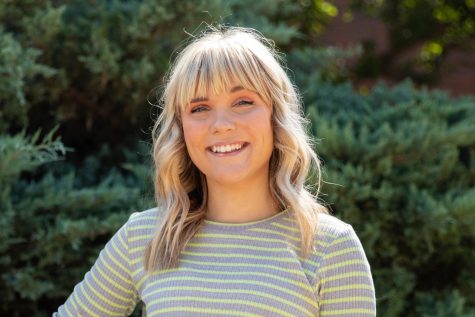Nursing students face uncertainty, call to duty as they enter field during COVID-19
Jennifer Tozier is a nursing student at Wichita State.
In the midst of a global pandemic and a recession, college graduates are scrambling for jobs. As they prepare to enter the workforce, graduating nursing students have a number of pressing questions.
How many nurses do hospitals need? Are new graduates prepared to hit the ground running?
Mitchell Farmer and Jennifer Tozier are two of the many senior nursing students asking these questions, among others.
Farmer said he’s optimistic that employers will be excited to hire new graduates.
“The word is that employers are very eager to bring on new nurses still,” he said. “This is a great environment to learn as a novice nurse. That’s the word we’re getting that employers are just as eager to get us working and contribute to the pandemic.”
Farmer, who currently works at St. Francis Hospital, is lined up to continue working there as a registered nurse after graduation.
“I definitely think Wichita State has prepared us very well,” Farmer said. “They tell us that you’re not an experienced nurse until three years into your career. Nursing school doesn’t teach you how to be a great nurse — they teach you how to keep patients safe and evidence-based practice. But becoming good at skills just takes time.”
Farmer said COVID-19 will ultimately bring out the best in nursing professionals.
“With the pandemic and everything going on, I definitely think there’s a healthy amount of fear and intimidation that goes along with that,” Farmer said. “But I think in the long run, it’s going to make nurses really hone in on their skills . . . doing what they can to keep patients safe. It’s just going to put an emphasis on that.”
Tozier said going into the nursing field during a pandemic is daunting, especially when it comes to the lack of personal protective equipment (PPE).
“When you’re going into a job that does already expose you to different things and there’s a shortage of the things that will protect you, it does create some fear,” Tozier said. “Am I going to be able to do my job and keep myself safe at the same time?”
The nursing capstone is a five-week period during which students are assigned to a location for first-hand experience. As with all other coursework, the capstone had to be converted to a remote format.
“We’re doing a virtual replacement for that,” Tozier said. “We’re still getting that critical thinking nursing judgement practice, which is great, but to miss that hands-on portion . . . was very frustrating.”
But that hands-on experience will come, she said.
“As nice as it would have been to get that practice, you know, we’ll get practice when we get our jobs,” Tozier said.
She said that because of the pandemic, many students are having to reevaluate what direction they need to go after graduation
“It’s definitely one of those things that are up in the air because everything is changing,” Tozier said.
“There might not be as many openings in other spots of nursing whereas the ICU is in need of more people. It’s kind of changing some of our minds on [what route to take].”
Tozier is interested in women’s health, but in the end, she said she wants to serve wherever she’s most needed.
“Our job is to serve the people who need us, and in the end, that’s what we’ll do,” she said.
Tozier said nurses play an even more critical role now that hospitals aren’t allowing guests in to visit patients.
“It just puts so much emphasis on that nursing role —to understand that this patient does not get to have their people with them,” she said. “You are the one person who gets to be with that patient. [You have to] make sure you are, you know, attentive and listen and speak to them and show them you care.
“You have to treat people with love and not just your nursing care.”

Lindsay Smith is the former editor-in-chief and newsletter editor for The Sunflower. Smith was a journalism major at Wichita State with a minor in creative...













